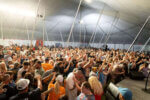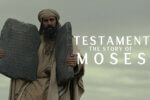As Great Britain’s historic Christian traditions decline, black churchgoers are taking the lead.
In the United Kingdom–a land where some believe church attendance is on the wane–people of African descent are becoming the driving force to spread the gospel, a recent survey shows.
More than half of London’s churchgoers are black, and the report by Christian Research concludes that Britain’s black churchgoers represent one of the island nation’s fastest growing sectors of Christianity.
Although only 8 percent of all Britons attend church regularly, some 27 percent of the U.K.’s African-Caribbean community attend church regularly. And in inner London, black people make up 51 percent of all churchgoers.
Peter Brierly of Christian Research believes the difference between church attendance in black and white communities in the United Kingdom is a result of several variables.
“We are moving into a form of churchless Christianity,” Brierly said. “There’s competition on a Sunday. People have school activities, music activities, people to visit and shopping. Black people have a tradition of going to church–it’s part of their culture. The wider community can learn something about their enthusiasm, commitment and enjoyment.”
In 1997, Joel Edwards became the first black general director of the Evangelical Alliance (EA), the representative body for 1 million Christians throughout the United Kingdom. A product of the black church, Edwards believes it is a tremendous spiritual force.
“The black church’s impact has been one of very high commitment in a time when people struggle with being committed to the Christian faith,” he
news
said. “This is exemplified by high church attendance, a commitment to the fundamentals of the Christian faith, and to the authority of God’s Word and preaching. The liberal theology which has eroded much of British faith has not touched the black church.”
Many black Christians belong to Pentecostal churches. The more than 3,000 black-led U.K. congregations are divided among branches of Pentecostal denominations based in the United States, branches of African denominations based in the United Kingdom and a growing number of independent congregations such as Kingsway International Christian Centre in London.
Kingsway made history when it opened its 4,000-seat auditorium in 1998, becoming the largest church to open in the United Kingdom in the last 140 years.
Ruach Ministries, based in the notorious area of Brixton, South London, is another well-known British-based independent church. Under the direction of its 34-year-old leader, Bishop John Francis, Ruach has grown from 18 people to 2,000 people in seven years.
Francis attributes Ruach’s growth to prayer and evangelistic activity.
“We conducted one-to-one evangelism outside Brixton [subway] every week, and on Saturdays we used to have open-air meetings,” Francis said. “They were really effective, and as a result, the growth of the church took off.”
Ruach has been successful in winning former criminals, drug addicts, prostitutes–society’s “no hopers”–to Christ. Francis now focuses much time in training his members to go and share Christ with others.
Francis is keen for Ruach to become more multicultural and has appointed white Britons to his leadership team. However, he is under no illusions of the difficulties he will face building a multiracial church.
“Some people find it difficult to accept the way black people express themselves. However, if we take Christ’s commands seriously, our churches must reflect the community,” Francis said.
Rev. Francis Sarpong, a church leader from Ghana, leads Calvary Charismatic Baptist Church, the largest Baptist church in the United Kingdom. More than 1,000 people attend the church, and Sarpong attributes that success to evangelism.
“We have impressed on church members the reason why we are Christians is to bring others to Christ and make them realize evangelism is their responsibility. Having such an attitude can only lead to results,” Sarpong
said.
Sarpong wants to see closer ties between black and white Christian communities in Britain.
“Black churches place a strong emphasis on evangelism and church growth. White churches have great structure and organization. Our skills complement each other, and we can learn a great deal if we work together.”
Britain’s black churches owe their existence to the racism encountered by African-Caribbeans during the 1950s and 1960s when they immigrated from the West Indies to work in England.
They expected Britain to welcome them with open arms, but they encountered racism. When they attended Britain’s traditional churches, they found they were not welcome.
Their bad experiences inadvertently fueled the development of the black- led church. As black congregations began to outgrow the homes in which they met, studied Scripture and prayed, church leaders rented church halls and civic centers until they were able to purchase buildings.
The 1970s and 1980s brought a second wave of immigration to the United Kingdom from Africa. Christians from these countries have built some of the U.K.’s biggest churches.
An attempt by black churches to unite and bridge the gap with white churches could gain momentum during Faith in the Future, an event organized by the African Caribbean Evangelical Alliance (ACEA). The event, scheduled for July, will comprise debates on major societal issues, seminars and worship services. Organizers hope to draw as many as 5,000 participants and inspire national media coverage.
Mark Sturge, general secretary of ACEA, believes the event will be groundbreaking. “It will allow the wider community to understand developments within our churches and hear our concerns,” he said.
Because of their nationwide growth as a body and their proven commitment to their faith, black Christians in Britain are poised to play a greater role than ever in communicating the Christian faith and making an important impact on an unchurched nation.






Leave a Comment
You must be logged in to post a comment.